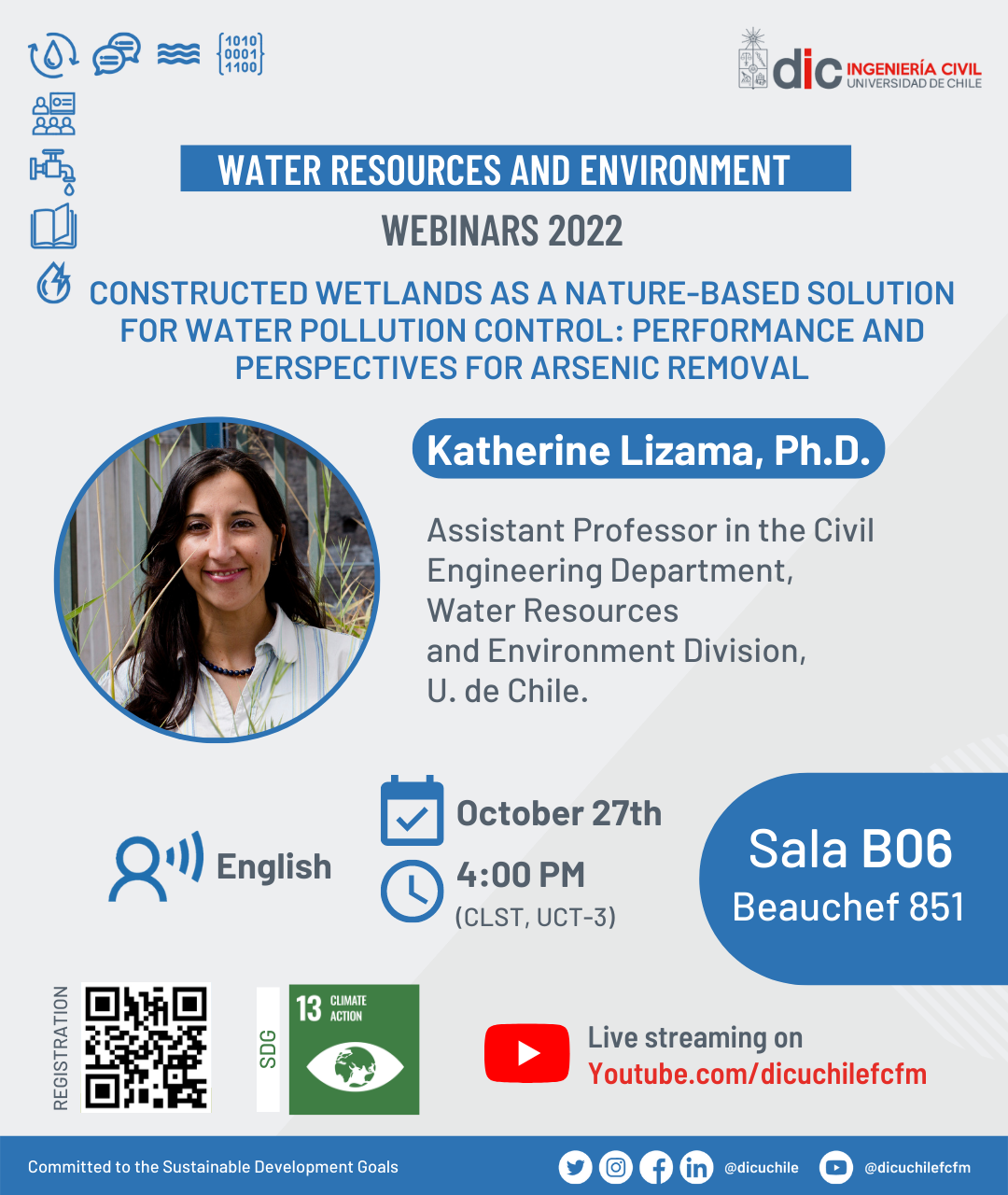 Seminario RHMA 24 Noviembre
5
Seminario RHMA 24 Noviembre
5
 Alberto De la Fuente Stranger 17 Nov 202217/11/22 a las 08:25 hrs.2022-11-17 08:25:17
Alberto De la Fuente Stranger 17 Nov 202217/11/22 a las 08:25 hrs.2022-11-17 08:25:17

Abstract
Diffuse sources of water contamination within catchments, such as agriculture, are a challenging problem for water quality management. Nutrient excess (e.g., nitrate and phosphate) harms ecosystems by producing eutrophication in water bodies and leading to biodiversity loss. Hydrological transport from sources to streams and biogeochemical transformations are primary drivers of variability in stream nitrate concentration. In our data-driven research, we study the nitrate concentration in stream water under different hydrologic conditions for a large sample of catchments (~200) in Germany. From runoff events to droughts, improving our understanding of how landscape modification interacts with hydrological events is critical to preventing future environmental damage under climate change.
Biography
Felipe Saavedra is a Ph.D. Student in the Catchment Hydrology department at Helmholtz Centre for Environmental Research - UFZ in Germany since 2020. He completed his undergraduate studies at Universidad de Chile, where the main topics were hydrological cycle in forested catchments and snow dynamics in Andes Central. His current research is focused on large-sample catchment hydrology, particularly understanding the impacts of anthropogenic landscape modification on the water quality of rivers under different hydrological conditions.In addition, he is part of the Chilean NGO Somos Agua, where he contributes to developing research on agroecological practices.
Canal de Youtube / Youtube channel: youtube.com/dicuchilefcfm
 Seminario RHMA 10 Noviembre
9
Seminario RHMA 10 Noviembre
9
 Alberto De la Fuente Stranger 7 Nov 202207/11/22 a las 15:27 hrs.2022-11-07 15:27:07
Alberto De la Fuente Stranger 7 Nov 202207/11/22 a las 15:27 hrs.2022-11-07 15:27:07

Canal de Youtube / Youtube channel: youtube.com/dicuchilefcfm
Abstract
Green hydrogen seems to be booming, again. But is this time different to the first ideas on the hydrogen economy from the 80s and early 2000s? Find out in this overview of markets and research.
Biography
Jannik Haas is Senior Lecturer in Sustainable Civil Systems at the University of Canterbury, New Zealand. His research revolves around future energy systems, including power-to-X economy, green farming, sustainable hydropower, and energy storage systems.
 Seminario RHMA 3 Noviembre
8
Seminario RHMA 3 Noviembre
8
 Alberto De la Fuente Stranger 3 Nov 202203/11/22 a las 08:59 hrs.2022-11-03 08:59:03
Alberto De la Fuente Stranger 3 Nov 202203/11/22 a las 08:59 hrs.2022-11-03 08:59:03

Canal de Youtube / Youtube channel: youtube.com/dicuchilefcfm
Abstract
Historically, ice-covered water bodies on Earth have been considered intriguing, quiescent, wintering, and hard-to-reach aquatic environments. However, driven by striking changes in ice phenology in the last decades, over the last seven years, interdisciplinary research years has revealed the complex biogeochemistry and the active fluid dynamics that seasonally ice-covered freshwaters support. During the seminar, I will overview what we know (in the western knowledge) about under-ice freshwater systems, emphasizing the mechanisms that may drive fluid motion and enhance mixing. Finally, I will highlight open topics that warrant research for the next decade.
Biography
Hugo Ulloa obtained his undergraduate degrees in Engineering Science and Geophysics at Universidad de Chile. After receiving a diploma in Civil engineering, Hugo pursued a PhD in Fluid Dynamics at the same University. During his PhD, Hugo investigated the Degeneration of internal gravity waves in a stratified rotating basin via numerical and laboratory experiments. After his PhD, Hugo was appointed as Postdoctoral Scholar at the University of California, San Diego, where he dove into the fluid dynamics of tropical coral reef aquatic systems. He then got a postdoctoral research position at the École Polytechnique Fédérale de Lausanne (EPFL), where his research ramified towards different topics involving the biogeochemistry and physics of alpine and polar lakes. In 2021, Hugo was appointed as Assistant Professor at the University of Pennsylvania, where he leads the Geophysical and Environmental Flows Laboratory. His current research focuses on (i) the fluid dynamics ice-covered water bodies, (ii) mixing and transport of geometrically controlled permeable flows, (iii) competition between convective modes of motion in differentially cooled and differentially heated water bodies, and (iv) the swimming strategies of microorganisms in aquatic environments.
 Seminario RHMA 27 Octubre
8
Seminario RHMA 27 Octubre
8
 Alberto De la Fuente Stranger 20 Oct 202220/10/22 a las 14:24 hrs.2022-10-20 14:24:20
Alberto De la Fuente Stranger 20 Oct 202220/10/22 a las 14:24 hrs.2022-10-20 14:24:20

Biography Dr. Katherine Lizama is an Assistant Professor in the Civil Engineering Department, Water Resources and Environment Area, Universidad de Chile. Her work areas include environmental engineering, water quality and control, geochemistry of metals and metalloids in aquatic systems, and natural treatment systems such as constructed wetlands for water pollution control. Abstract Constructed wetlands are a nature-based solution for water pollution control, able to remove different pollutants, including arsenic. Even though they have potential for arsenic removal, the lack of design guidelines limits their application for this purpose. In this seminar, I will present and discuss the key findings of my research on the performance of subsurface flow constructed wetlands in the removal of arsenic from contaminated water , and perspectives for current and future research.
 Seminario RHMA 13 Octubre
7
Seminario RHMA 13 Octubre
7
 Alberto De la Fuente Stranger 7 Oct 202207/10/22 a las 13:03 hrs.2022-10-07 13:03:07
Alberto De la Fuente Stranger 7 Oct 202207/10/22 a las 13:03 hrs.2022-10-07 13:03:07

Speaker: Dr. Maricarmen Guerra
Location: Online
YouTube Live: youtube.com/dicuchilefcfm
Date: October 13, 2022
Time: 14:30 - 16:00 (CL time)
Abstract
The success of a tidal energy project requires an accurate description of the turbulent inflow conditions, and of the hydrodynamic impacts that energy extraction and turbine presence causes to the natural environment. However, most field surveys are spatially sparse and of limited duration because tidal turbines are installed in sites with strong currents (i.e. higher available power), where measurements are challenging and expensive.
In this talk I will present novel field observations obtained for the spatial characterization of turbulent flows at promising hydrokinetic energy sites. Specifically, we have developed a drifter-based methodology to obtain spatial maps of flow velocity and turbulent quantities prior to and during the operation of full-scale hydrokinetic turbines. This method has been successfully applied under steady state flow in the Kvichak river (Alaska, USA) to measure the wake of ORPC RivGen turbine, and under unsteady tidal flow in Grand Passage (Nova Scotia, Canada), where Sustainable Marine Energy Canada operates a floating tidal turbine array. For each case study we captured the wake of the turbines, we observed the expected velocity deficit and increased turbulence downstream of the turbines, we evaluate the wake evolution and recovery, and quantify the total energy dissipated by turbulence within the wake.
Biography
Maricarmen Guerra is an Assistant Professor at the Universidad de Concepción in the Civil Engineering department. Maricarmen studies the coastal environment hydrodynamics using innovative field methods and numerical modeling. She specializes in the study of currents, turbulence, and waves with application to various topics such as turbulent wakes, marine energy extraction, and floods.
 Seminario RHMA 29 Septiembre
7
Seminario RHMA 29 Septiembre
7
 Alberto De la Fuente Stranger 23 Sep 202223/09/22 a las 09:15 hrs.2022-09-23 09:15:23
Alberto De la Fuente Stranger 23 Sep 202223/09/22 a las 09:15 hrs.2022-09-23 09:15:23
Speaker: Dr. Lieke Melsen
Location: Online
YouTube Live: youtube.com/dicuchilefcfm
Date: September 29, 2022
Time: 14:30 - 16:00 (CL time)
Abstract
Even if you give different people the same recipe and ingredients, the final dish will still taste
differently. The same applies to the use of computer models: different modelers will make
different choices, leading to different model results. In this study, I interviewed 14 modelers
to study their modeling choices. In total, 83 different reasons to make a certain decision were
identified. The most frequently mentioned reason to do something in a particular way, was
the experience from colleagues. Most reasons were context dependent, they were for
instance related to time constraints, available resources, colleagues, and personal
preferences. This makes model results time and place dependent. It is important to be aware
of this when estimating how reliable model results are.
Biography
Lieke Melsen works as assistant professor in the field of computational hydrology at Wageningen University, the Netherlands. Her research focuses on the selection and use of models, considering modelling as a socio-technical activity, and the consequences for model uncertainty. For this she combines technical approaches - model ensembles, sensitivity analysis - with quantitative research methods - interviews, ethnographic research.
 Seminario RHMA 1 Septiembre
6
Seminario RHMA 1 Septiembre
6
 Alberto De la Fuente Stranger 25 Ago 202225/08/22 a las 14:09 hrs.2022-08-25 14:09:25
Alberto De la Fuente Stranger 25 Ago 202225/08/22 a las 14:09 hrs.2022-08-25 14:09:25

Speaker: Dr. Roseanna Neupauer
Location: Online
YouTube Live: youtube.com/dicuchilefcfm
Date: September 1, 2022
Time: 14:30 - 16:00 (CL time)
Recent Advances in Estimating Stream Depletion
Abstract
Stream depletion is the reduction in the flow rate in a stream as a result of extraction of groundwater from a well from an aquifer that is hydraulically connected to the stream. The amount of stream depletion depends on hydraulic properties of the aquifer and stream, distance between the extraction well and the stream, and the pumping rate. In water scarce regions, groundwater extraction is only permitted if stream depletion can be shown to remain below a pre-specified threshold value. Thus, the quantification of stream depletion is of extreme importance. This seminar will present an overview of stream depletion and will highlight some recent advances in methods for calculating stream depletion.
Biography
Dr. Roseanna Neupauer is a Professor and President’s Teaching Scholar at the University of Colorado Boulder in the Department of Civil, Environmental and Architectural Engineering. She received a B.S. in Civil Engineering from Carnegie Mellon University, a B.A. in Spanish from University of Colorado, an M.S. in Civil Engineering from MIT, and an M.S. in Math and a Ph.D. in Hydrology from the New Mexico Institute of Mining and Technology. Her research focuses on groundwater flow and transport modeling, with applications to groundwater remediation, stream depletion quantification, subsurface hydrology in frozen and partially frozen ground, and protection of water supplies and groundwater dependent ecosystems from chemical and thermal contamination. She is a Fellow of the Geological Society of America and the Environmental and Water Resources Institute of the American Society of Civil Engineers.
 Seminario RHMA 18 Agosto
10
Seminario RHMA 18 Agosto
10
 Alberto De la Fuente Stranger 18 Ago 202218/08/22 a las 07:48 hrs.2022-08-18 07:48:18
Alberto De la Fuente Stranger 18 Ago 202218/08/22 a las 07:48 hrs.2022-08-18 07:48:18

Speaker: Dr. Lucía Scaff
Location: Sala/Room B06
YouTube Live: youtube.com/dicuchilefcfm
Date: August 18, 2022
Time: 14:30 - 16:00 (CL time)
Title: Hydrometeorological applications of regional climate models at convection permitting scales
Abstract
Long term simulations using convection-permitting regional climate models are a great tool to analyze hydrometeorological phenomena. These models are especially useful in remote environments with sparse observations, and to assess potential changes under future scenarios. Improving these simulations at convective resolving scales require a careful assessment for robust characterizations of climate change impacts at regional scales. Even more, their validation is essential to understand strengths and weaknesses on representing atmospheric and land-surface processes. In this webinar, an introduction will be given about the benefits of convection-permitting modeling and their verification for a variety of hydrometeorological variables. Then, examples will be shown about mesoscale atmospheric processes, its impacts on the snowpack and related changes in a warmer climate. Finally, some ongoing efforts to produce long-term regional climate simulations over South America will be presented.
Biography
Dr. Lucia Scaff is a former student of the Department of Civil Engineering at Universidad of Chile. She got her PhD at the University of Saskatchewan, Canada, in 2019, and since then has been working on hydrometeorological studies using high-resolution atmospheric models. Dr. Scaff is currently working as a postdoctoral fellow at the Water Research Center for Agriculture and Mining (CRHIAM) in Chillán.







